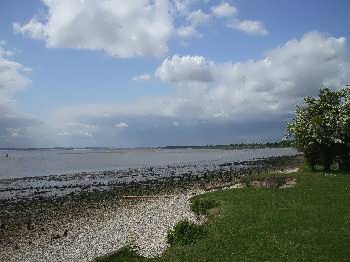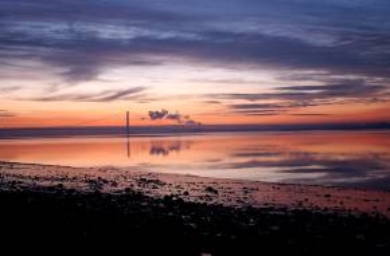An occasional blog post on my favourite poems, starting with ‘HERE’ by Philip Larkin.
HERE
Swerving east, from rich industrial shadows
And traffic all night north; swerving through fields
Too thin and thistled to be called meadows,
And now and then a harsh-named halt, that shields
Workmen at dawn; swerving to solitude
Of skies and scarecrows, haystacks, hares and pheasants,
And the widening river’s slow presence,
The piled gold clouds, the shining gull-marked mud,
Gathers to the surprise of a large town;
Here domes and statues, spires and cranes cluster
Beside grain-scattered streets, barge-crowded water,
And residents from raw estates, brought down
The dead straight miles by stealing flat-faced trolleys,
Push through plate-glass swing doors to their desires –
Cheap suits, red kitchen-ware, sharp shoes, iced lollies,
Electric mixers, toasters, washers, driers –
A cut-price crowd, urban yet simple, dwelling
Where only salesmen and relations come
Within a terminate and fishy-smelling
Pastoral of ships up streets, the slave museum,
Tattoo-shops, consulates, grim head-scarfed wives;
And out beyond its mortgaged half-built edges
Fast-shadowed wheat-fields, running high as hedges
Isolate villages, where removed lives
Loneliness clarifies. Here silence stands
Like heat. Here leaves unnoticed thicken,
Hidden weeds flower, neglected waters quicken,
Luminously-peopled air ascends;
And past the poppies bluish neutral distance
Ends the land suddenly beyond a beach
Of shapes and shingle. Here is unfenced existence;
Facing the sun, untalkative, out of reach.
There is a train journey here, a swaying observer watching the changing landscape. It might be Hull, but could stand for anywhere similar – the jumble and clutter of the central stanzas are spiky and uncomfortable to read, perhaps even a little snobby – but maybe many of us have cast a tired eye over Saturday shopping and longed to escape town at that moment, and escape all those jostling people, to quiet, to space.
I’ve driven into Hull many times. I know those shining sands, that wide river’s ‘slow presence’. It’s beautiful. When you cross the Humber Bridge, it’s best to be a passenger, as you long to gaze out of your window down the long view of the river stretching away impossibly broad, There is an indefinable need to leave that car, that bridge and soar away downstream to…somewhere.
But what makes Larkin’s final vision so perfect is that he knows this is not possible, that there is no one ‘Here’, and that’s what makes it so lovely – ‘leaves unnoticed thicken’, ‘Hidden weeds flower’, ‘neglected waters quicken’ – these are separate from and utterly disengaged from us. The air is inhabited only by light. Unlike people, it is ‘untalkative’ and as much as we yearn, it is perpetually beyond us, beyond our understanding, ‘out of reach’.
It’s not easy to explain how much this poem means to me. The final stanza is something I read over and over, to see if I can ever fathom how it works, how on earth he did it, that magic. Sometimes I just read it to prepare myself for a day’s writing, to put myself in that place, of ‘unfenced existence’, where every writer wants to be.
To celebrate #NationalPoetryDay, here’s a blog post I did on one of my favourite poems of all time – Here by Philip Larkin.

